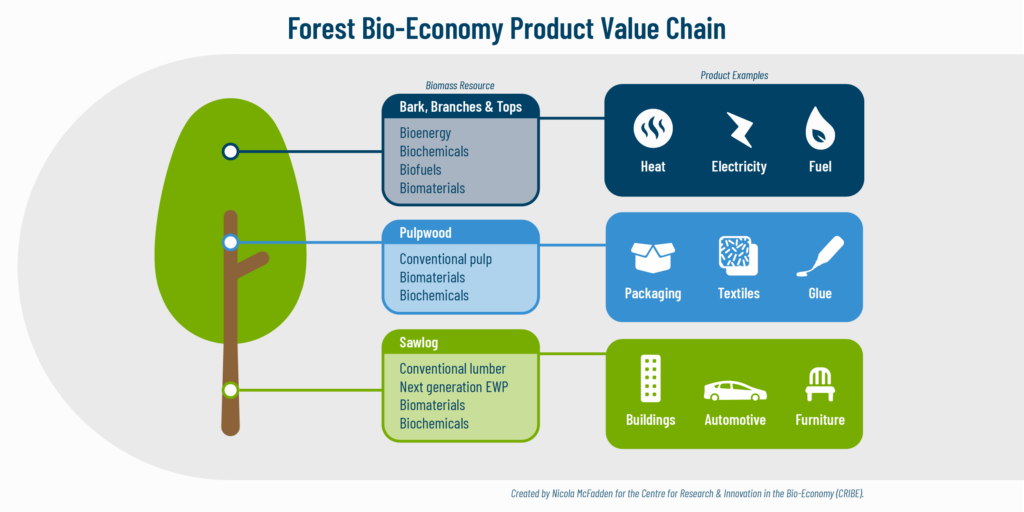Cultivating Ontario’s Economic Powerhouse: The Forest Bio-Economy

Ontario’s vast forest lands, well-established industries, and fulsome government policy position Ontario as Canada’s economic engine and leader in forest innovation.
With the rising impacts of climate change and global insecurity, there is a significant need to develop more products and technologies locally. There are many potential pathways in forest innovation to replace fossil fuel products across sectors that could help Ontario meet its low-carbon goals.
What is the forest bio-economy?
The forest bio-economy makes use of sustainably managed forest biomass to manufacture bio-based products and technologies.
From the forest to consumer products, the forest bio-economy encompasses all innovative, low-carbon materials derived from sustainably sourced forest biomass, and the supply chains that serve to produce those materials.
Biomass can be derived from any part of the tree, including those that would traditionally become waste, such as bark or branches. Examples of bio-based products produced in a bio-economy include: fuel, packaging, textiles, sustainable chemicals (glue/resins), buildings, and transportation (explore our interactive bio-economy tool). Ultimately, the forest bio-economy contributes to reduced emissions and petrochemical use in the manufacturing of these products.

What is Ontario’s forest bio-economic advantage?
“Ontario is Canada’s economic engine where new innovations, platforms and technologies meet the muscle of the industrial economy.” (Source)
The province has a few key factors reinforcing this statement:
A wealth of natural resources.

Wood in Ontario is sustainably harvested and plentiful; the province’s forests can support a sustainable harvest of 27 million cubic metres annually, only roughly 50% of which is currently being utilized.
Significant human resources.

A robust innovation ecosystem.
- World-class pilot & research facilities
- Leading research & development in clean technology and forest bio-economy
Well-established industries.

And fulsome government policy.
- Forest Sector Strategy
- Biomass Action Plan
- Electric Vehicle Initiatives
- Critical Minerals Strategy
- Housing Strategy
- Build Ontario
Considering this strong industrial foundation, Ontario is well positioned to be a global leader in the production and innovation of advanced wood-based materials and building solutions. There is a wide range of opportunities for new entrants that would support the existing forest industry, produce made-in-Ontario solutions, and contribute to the wealth and health of the province.
Specifically, the province could benefit largely from the development of integrated bio-refineries & bio-product mills. Leveraging existing industry, these operations could extract & produce new value added products for use in manufacturing (i.e. automotive and construction). Advanced products such as lignin, biochar, and renewable fuels can all be made with existing commercial-ready technologies.
With the right government support, these products can be brought to market and Ontario can become a leader in the space. Here’s what’s needed to take advantage of this opportunity:
- Enabling policies for bio-based products, carbon sequestration, carbon accounting
- Investment in Ontario-made supply of advanced forest-based products
- Novel policies such as green procurement mandates through Ontario government purchasing
For more information and access to current resource data click here.